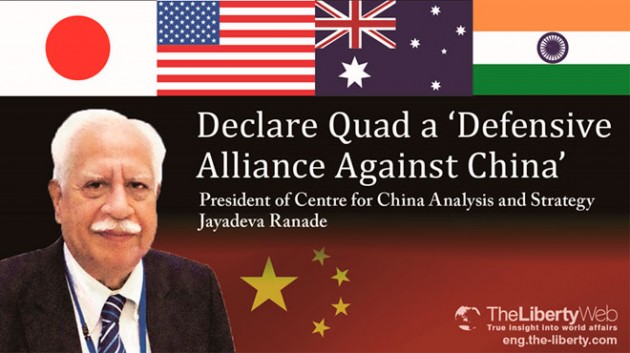Declare Quad a ‘Defensive Alliance Against China’
The Liberty spoke with an expert in India who has long been sounding the alarm about China’s threat — he calls for a containment against China led by Japan and India.

About Jayadeva Ranade
Jayadeva Ranade is a former Additional Secretary in the Cabinet Secretariat, Government of India, and he is a former Member of the National Security Advisory Board (NASB), as well as a former Minister in the Indian Embassy in Washington. He is now the President of Centre for China Analysis and Strategy. He is also the author of “China Unveiled: Insights into Chinese Strategic Thinking” (2013); “Cadres of Tibet” (2018) and “Xi Jinping’s China” (2018).
――You’ve pointed out that India and Japan can still cooperate on a large scale without the U.S. Could you explain this point in further detail?
Mr. Ranade: We can look at it from two perspectives: the first is the economic perspective, and the second is the defense perspective.
If we look at it from the economic point of view, in Japan the business sector is putting a lot of pressure on the Japanese government to keep good relations with China so that they don’t get hurt financially. But the government needs to persuade the Japanese business groups to cooperate with them in exploiting, or in coming to, the Indian market. It will also free the Japanese government into being able to take more reciprocal and tough actions against China.
As far as the military side is concerned, we can look at cooperation in the maritime zone. Japan, if it is willing, can maybe form a joint venture with India to manufacture aircraft. Or it can have a joint venture to manufacture warships.
――Japan’s Maritime Self-Defense Force has sent troops to Djibouti in the African region to protect ships from pirates. Do you think we need to send more of these troops to the Indian Ocean?
Mr. Ranade: There are two things. One is, of course, the actual protection of shipping. I think there is enough force already deployed to ensure safety by and large. But it is also to show a presence, to show the Japanese flag. I think that is also what Japan needs to do, considering that the Chinese today have a permanent presence in the Indian Ocean. Their fleet is there all the time.
Indian fleets are already operating there. Now, we have the Americans coming in, the French coming there, the Germans coming there. The British are planning to come in and also go into the South China Sea. In 2020, Australia joined the Malabar naval exercises along with India, Japan and the U.S. So I think the field is open for Japan to come and maybe have exercises there with the other navies also.
Also, I don’t know why [the Japanese] still call it the Self-Defense Force, I thought they are now calling it the Japanese Navy.
――Can the four nations of Quad, the U.S., Japan, Australia and India, contain China?
Mr. Ranade: I think if Biden follows Obama’s policy, then we will see China’s rise accelerating because Obama was not able to craft a robust policy towards China.
The question is, will these countries be willing to confront China? I would put a question mark on Japan.
They are all democracies, and they all believe in freedom of navigation of the seas and the freedom of overflights. That is not the issue. Will they be willing to stand up to China? After all, NATO’s objective was very clear, to end aggression by Russia. If each nation in the Quad says, ‘We will prevent aggression by the Chinese,’ then it gives some substance to Quad.
For Japan, it is vital that the sea lanes and the air routes remain open and free. They are very dependent on imports.
――May I ask you about the defense budget? India’s defense budget has actually grown at a rate of 37% from 2010 to 2019, and India’s budget is the third largest in the world. On the other hand, Japan’s defense budget has only grown by 2% during the same time period.
Mr. Ranade: The threat from the Chinese is direct, and we are seeing it today. Since May, there has been a confrontation and it still continues – military confrontation – with 60,000 Chinese troops on [India’s] borders. So it costs a lot of money to block and deter them and to prepare for any eventuality, like hostilities, in case they decide to go in for military action. We also have a very long coastline, and a big economic exclusion zone, as well as territorial waters. Given that our needs are quite high, I don’t think that our military expenditure is in excess. Today, of course, there has been emergency expenditure over the Chinese presence, but actually much more is required.
In fact there has been more military activity around Japan in the last year or two, Chinese flights taking place and ships coming in, coast guard coming in. I think Japan certainly needs to enlarge its forces, particularly the self-defense maritime force and the air force, and spend more either to develop it itself or to buy more weaponry in terms of missiles, battleships, etc., because when the Chinese decide to do something, it will be sudden. It will be rapid. At that time, to try and build up the necessary force strength may be difficult.
――May I ask you about the idea of freedom and democracy? We believe that the Indian people have a faith-based, democratic spirit, and this would be a strong vaccine against the Chinese Totalitarian regime. Could you share your view on this point, faith-based, democratic spirit?
Mr. Ranade: Yes. I agree with you that democracy and religious freedom are very important. And in countries like ours, yours and mine, we certainly are not going to give it up. And the people, at large, are not going to give it up. In India, we are a peace-loving country. We don’t want to pick a fight with others. But China has damaged its own reputation by repeatedly engaging in aggressive action. And as I said, now, one that even we know.
So there is no trust now, as far as India and China are concerned. And whatever relationship we had, we have to rebuild, just to get along — I’m not saying we are going to become friends. So that’s certainly the case. And that is the case with Japan. I think that is the case with Taiwan. The levels may vary, but the fact that we are democracies and we have our own beliefs, goes against what the Chinese have and what the Chinese are preaching to others.
When they talk about a community or a community of shared destiny, they’re talking about destiny that Beijing decides. And the world community which they lead, which means we will all think the way we are asked to think, we will do what we are asked to do — I don’t see that working. So it becomes more important that we try and resist this.
Particularly now, when at least to my mind, what I see is Xi Jinping trying to make China, I would say, a Communist fortress. He is trying to blend Communism and Nationalism together and make it a fortress. But that is not something that others would like. And there would be resistance, I think, even within China. So certainly, there is a common bond for all of us. Like you said earlier, Quad itself has a common bond of faith and freedom. So do most of the countries, in fact. And so I think that’s the commonality that we need to build on and that we need to strengthen.



















